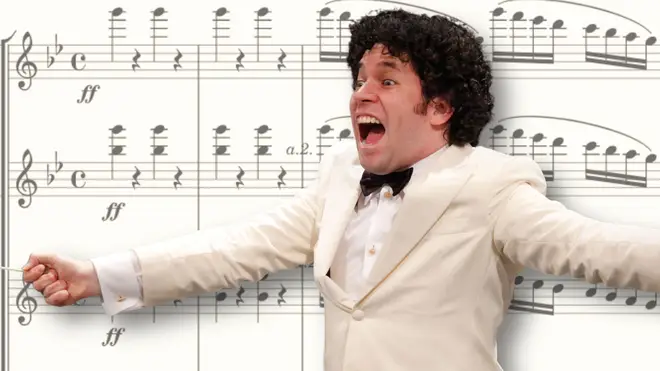On Air Now
Early Breakfast with Sam Pittis 4am - 6:30am
8 February 2024, 16:52

Big pieces, big orchestras, big sounds, big everything. These are the most epic pieces of classical music ever written.
Classical music can be gentle and melodious. It can relax, inspire and provide a powerful escape. But it can also be BIG.
From gargantuan organ symphonies to clamouring requiems, we’ve found some of the biggest works in classical music. It’s about to get epic...
Read more: 10 most relaxing pieces of classical music
Thundering bass drums, swirling strings and the frenzied cry of a thousand sopranos makes this possibly the most epic ‘Dies Irae’ of all Requiems. It’s marked ‘Allegro agitato’ for a reason – it’s literally impossible to feel down while listening to this.
Read more: 15 of the greatest classical choral works ever written

Verdi’s Requiem: “Dies irae”
How about the creation of the entire world in a single piece of music? Joseph Haydn was the undisputed master of the Classical era, and this was his unequalled masterpiece. It’s all about the famous six days of creation as told in Genesis, with inspired orchestration, lyrical solo singing and grand, thundering choruses – because how else would you create the world in music?

Haydn: The Creation | Nederlands Kamerkoor, Concerto D’Amsterdam & Klaas Stock (2009)
Composer and activist Ethel Smyth wrote the official anthem of the suffragette movement. But even more epic is her opera The Wreckers, set in a remote 18th-century Cornish village, with a bold, rich score to evoke a tragic story. Smyth was so outraged at the cuts that were made to her opera in its first run of performances, she stormed into the orchestra pit and confiscated the sheet music.

Smyth, Ethel (1858-1944) - Wreckers Overture
Considered the pinnacle of Beethoven’s musical genius, this colossal symphony is still one of the greatest ever written, and one of the most thrilling live music experiences. The final movement, with its triumphant ‘Ode to Joy’ chorus, is a glorious cry for the brotherhood of man – a vision Beethoven subscribed to.

Beethoven Symphony No 9 Flashmob in Nuremberg, Germany.
At the 1913 premiere of Stravinsky’s ballet, audiences were so shocked by what they heard that they started a riot. Stravinsky’s total disregard for musical tradition, and penchant for dissonance, twittering woodwinds and jolting rhythms, were supposedly the reason for the concertgoers’ impassioned reaction. And a riot it remains, to this day…

Stravinsky The Rite of Spring // London Symphony Orchestra/Sir Simon Rattle
If you’re after sheer noise and impression, no work does it quite like this roaring organ symphony. After the resounding success of its premiere, the composer himself vowed to never again return to the genre, such was the pinnacle of his achievement. “I gave everything to it I was able to give,” Saint-Saëns said. “What I have here accomplished, I will never achieve again.”

Saint-Saens: Symphony No. 3 "Organ" - Finale (Auckland Symphony Orchestra) 1080p
The great movie music composer wrote so many memorable films over his incredible career, but there is something additionally epic about this one. With brass fanfares, orchestral hits and soaring melodies, Williams brings Christopher Reeve’s man of steel alive in the greatest superhero soundtrack of all.
Read more: John Williams’ 10 greatest movie soundtracks

John Williams, Berliner Philharmoniker – Superman March (Official Music Video)
Mahler knew how to create a big, emotional symphony – but his third is on another scale altogether. Over 90 minutes this musical journey stretches what a symphony can be. It all ends with the most beautiful finale, where Mahler creates a musical depiction of something both utterly simple, and completely boundless: love.

Gustav Mahler - Symphony No. 3 (Lucerne Festival Orcherstra, Claudio Abbado)
Long regarded as the pinnacle of virtuosic repertoire, Rachmaninov’s 1909 piano concerto delivers every single time. Expect thrilling clamour from the blurry-fingered soloist, the composer’s trademark soaring, singing melodies in the orchestra, with moments of euphoric symphonic bursts. It delivers every time.

Yunchan Lim performs Rachmaninov Piano Concerto No.3 for the Cliburn Competition
The Renaissance period is famed for its choral music, and the complex interweaving lines of a mass or motet for four, six or eight independent voices. So how about the 16th-century English composer and his mammoth work for 40 independent voices. Composed for eight choirs of five voices, as a listener you simply feel enveloped in the music as 40 voices come together in a piece of music that would be overwhelming, if it was not just so perfect in every way.

Spem in alium, performed by the Ora Singers at the Tate Modern in London